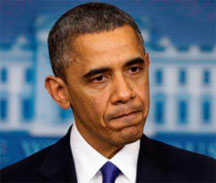WASHINGTON, (Reuters) – President Barack Obama announced plans yesterday to limit sweeping U.S. government surveillance programs that have come under criticism since leaks by a former spy agency contractor, saying the United States “can and must be more transparent.”
“Given the history of abuse by governments, it’s right to ask questions about surveillance, particularly as technology is reshaping every aspect of our lives,” Obama told a news conference at the White House.

Saying that it was important to strike the right balance between security and civil liberties, Obama vowed to improve oversight of surveillance and restore public trust in the government’s programs.
“It’s not enough for me as president to have confidence in these programs. The American people need to have confidence in them, as well,” Obama said, adding that he was confident the programs were not being abused.
Obama’s announcement – made just before Obama heads for summer vacation on Martha’s Vineyard – may be greeted as a partial victory for supporters of ex-NSA contractor Edward Snowden who is now in Russia, where he was granted asylum last week.
The Obama administration has vigorously pursued Snowden to bring him back to the United States to face espionage charges for leaking details of the surveillance programs to the media.
“I don’t think Mr. Snowden was a patriot,” Obama said at the news conference, brushing off the suggestion that yesterday’s announcement showed Snowden had done the right thing in revealing the extent of the government’s programme.
The president said he had ordered a review of the surveillance programmes before Snowden provided secret documents to The Guardian and The Washington Post, but he added that there was no doubt those leaks triggered a “much more rapid, passionate response” to the issue.
Obama said he had decided on four specific measures.
Firstly, he said, he plans to work with Congress to pursue “appropriate reforms” of Section 215 of the anti-terrorism Patriot Act that governs the collection of so-called “metadata” such as phone records. He insisted that the government had no interest in spying on ordinary Americans.
Obama did not specifically lay out how the program will be reined in, however. Instead, he pledged greater oversight, greater transparency, and constraints.
Civil liberties advocates wanted more details.
“He said he would recommend 215 reform, but he said ‘appropriate’ reform and we don’t know what that means,” said Electronic Frontier Foundation digital rights analyst Trevor Timm. “There were no concrete changes to the actual surveillance programs.”
Outlining his second measure, Obama said he would pursue with Congress a reform of the secretive Foreign Intelligence Surveillance Court, which considers requests from law enforcement authorities to target an individual for intelligence gathering.
Obama said he wants to let a civil liberties representative weigh in on the court’s deliberations to ensure an adversarial voice is heard. The court, authorized under the Foreign Intelligence Surveillance Act of 1978, has been criticized for essentially rubber stamping the U.S. government’s requests to search through Americans’ electronic records.
Currently, the FISA court makes its decisions on government surveillance requests without hearing from anyone but U.S. Justice Department lawyers in its closed-doors proceedings.
Appointing a civil liberties advocate to argue before the surveillance court may have little value, said Carrie Cordero, director of national security studies at Georgetown University Law Center and a former Justice Department lawyer.
“I will be interested to hear how this would work in practice, but as an initial reaction, I do have concerns about additional layers of bureaucracy slowing down the speed and agility of conducting counterterrorism activities,” Cordero said in an email.
Thirdly, Obama said he wants to provide more details about the NSA programs to try to restore any public trust damaged by the Snowden disclosures.
The fourth measure was the creation of a high-level group of outside experts to review the U.S. surveillance effort.
Gigi Sohn, head of public interest group Public Knowledge, said Obama’s plans were a good start, but added: “It’s going to depend a lot on Congress.”
The American Civil Liberties Union called the proposals “a necessary and welcome first step.”
Executive Director Anthony Romero said the ACLU favors revamping all U.S. surveillance programs to adhere to constitutional protections.
The NSA declined to comment on Obama’s proposals. It is not clear if Congress will take up the initiatives. A number of influential lawmakers have vigorously defended the spying programs as critical tools needed to detect terrorist threats.
U.S. Senator Dianne Feinstein, head of the Senate Intelligence Committee, said in a statement that her panel will hold a series of hearings to study the surveillance programmes.
